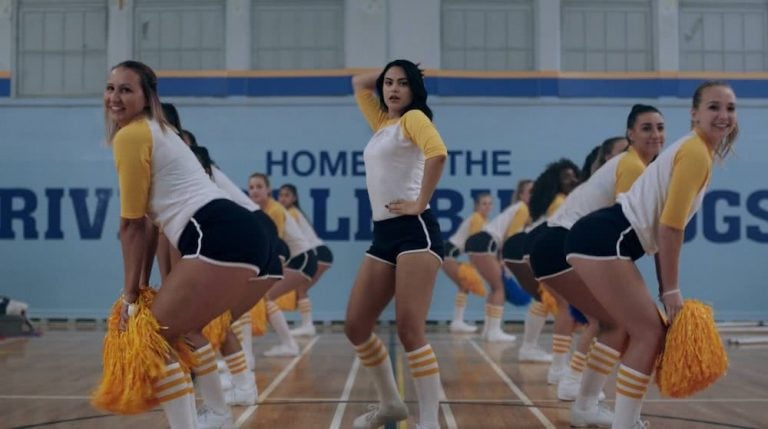There are a lot of ways to describe Riverdale. It’s a CW teen soap (loosely) adapted from Archie comics. It’s – to crib Charles Bramesco’s term – “Hot Archie Who Fucks.” It’s gloriously trashy melodrama. But if I were to pick one word, it’d be this:
Extra.
Riverdale is as extra as extra gets. This is a show where Hot Archie (K.J. Apa) is blackmailed by an FBI agent to investigate Seductive Veronica’s (Camila Mendes) mafioso father, while the bookish Jughead (Cole Sprouse) asserts his authority over the local bikie gang and his girlfriend Betty (Lili Reinhart) helps her mother cover up a murder. In the background, Cheryl Blossom (Madelaine Petsch) is presumably pirouetting in a ball gown as Kevin Keller (Casey Cott) delivers dry bon mots. It’s the sort of delicious trash that mimics masterpieces by draping its awful dialogue in red velvet and beautiful people. God, it’s fucking wonderful.
It’s the sort of delicious trash that mimics masterpieces by draping its awful dialogue in red velvet and beautiful people.
To a large extent, Riverdale – streaming here on Netflix when it’s not on Olympics-inspired hiatuses – is the kind of show you have to qualify your enthusiasm for. You know: “Oh, it’s dumb, but that’s why it’s so great!” Which, yes, is true. There’s no denying this show is frequently very stupid. Here’s the thing, though: to frame its exquisite melodrama as ‘so bad its good’ entirely elides Riverdale’s genius. Perhaps “genius” is a stretch, but the way the show combines queer aesthetics with an exaggerated exploration of teen identity experimentation is far cleverer than you’d expect from its egregiously silly storylines.
First of all: the show looks spectacular. Riverdale’s heightened aesthetics – a neon-lit diner, gritty biker bars, candy-coloured school halls – ensure that even when the dialogue is deeply daft, the sight on screen looks sumptuous. No surprise that the series has steadily picked up teen fans through the screengrabs and gifs inundating Tumblr (the impossibly photogenic cast doesn’t hurt).
These aren’t just pretty pictures. Showrunner Roberto Aguirre-Sacasa and his rotating suite of directors (a roster featuring, refreshingly, plenty of women and people of colour) demonstrate a debt to film and television history. The episode titles pay homage to classic films – “In A Lonely Place”, “The Sweet Hereafter”, “Death Proof” – and film references are often incorporated wholesale into the episodes proper.
Love Music?
Get your daily dose of metal, rock, indie, pop, and everything else in between.
You just have to look at the casting for acknowledgement of the teen soaps gone by; 90210’s Luke Perry as Archie’s dad, Twin Peaks’ Mädchen Amick as Betty’s mum and All My Children’s Mark Consuelos as Veronica’s dad. (One-time teen heartthrob Skeet Ulrich, as Jughead’s dad FP Jones, may never have starred in a teen soap, but he’s settling into his twilight years as a bikie-boss-cum-diner-waiter with commendable grace.)
The way the show combines queer aesthetics with an exaggerated exploration of teen identity experimentation is far cleverer than you’d expect from its egregiously silly storylines.
I mentioned queer aesthetics earlier, and the show’s low-key queerness is key to its success. I’m not (solely) referring to queer narrative elements, whether it’s an episode about Gay Best Friend Kevin’s flirtation with cruising, or Betty’s long-lost twink brother (Hart Denton) who’s probably a sex worker and is definitely creepy. Nor am I (solely) referring to the wrestling episode directed by Gregg Araki, though that’s set a high bar to clear as the gayest thing you’ll see on network television this year.
Rather, the show’s queerness is embodied in the show’s play with camp and melodrama, all that aligned with an exaggerated sense of hyperreality that mimics the heightened emotions of our teen years. This is a show that revels in trash soap tropes, for sure, but it’s also a show about the play with identity that comes in our young adult years, where we try on personas like a makeover montage, looking for the version of ourselves that fits just right. Riverdale realises queerness as an expression of who we are, as a rejection of norms and an experimentation of self.
And this is crucial to why Riverdale works so well as a melodrama. This play of personas allows the show to create a sequence of big shocking twists that, while lurid, don’t feel inorganic. Many of its more grown-up soap compatriots – Revenge, Empire, anything by Shonda Rhimes – rely on storytelling surprises to keep audience attention and jolt us out of peak TV stupor. But as these shows progress, narrative coherency is sacrificed to keep the twists coming (think the latest season of Game Of Thrones, which gave up on a rich, realistic universe in favour of unadulterated fanservice). Character consistency is less important than those Big Moments, but the net result is an erosion of any kind of emotional foundation for the show as the years drag on.
Riverdale has (so far) avoided this problem and presented a string of lurid, ludicrous twists by steering into the fluidity of teen identity. When nice girl Betty does a burlesque number in a crowded bikie bar, it’s not a cheap ploy – well, not only a cheap ploy – because it’s tied to her rejection of her demure image (complicated by her recognition of her parents’ supreme hypocrisies). Archie becoming an ally of Veronica’s mafia-aligned father is silly (two words: “Papa Poutine”), but it also represents him chafing against his aw-shucks earnestness.
By framing its ‘Days of Our Lives For Kids!’ schlock as a heightened, pseudo-cinematic exercise in identity experimentation (and just generally being extra), Riverdale manages to have its cake and eat it too. It’s smart and dumb; trash and superb; crude and sophisticated. It’s a deeply self-aware show filled with deeply naïve characters, and a perfect antidote to the seriousness of so many contemporary television dramas. Long live Riverdale.
Riverdale is streaming on Netflix now.

































